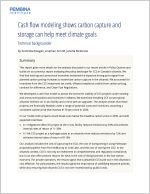
The Green Budget Coalition, of which Pembina Institute is a member, is calling on Canada’s governing parties to support an economic recovery from the COVID-19 pandemic that creates jobs while accelerating Canada’s responses to climate and biodiversity crises.
This coalition comprises 25 of Canada’s largest environmental and conservation organizations which together have more than a million members and supporters, and decades of experience solving Canada’s biggest environmental challenges. It is recommending a $10 billion investment in building retrofits to improve energy efficiency and phase out fossil fuels starting with schools, hospitals, social housing and residential buildings, and a $4.8 billion investment in clean transportation. (Note: In October, the Canada Infrastructure Bank announced its Growth Plan committing $2 billion to large-scale building retrofits, and $1.5 billion to accelerate the adoption of zero-emissions buses and charging infrastructure.) The coalition is also calling for $2.6 billion to reduce carbon emissions using nature-based solutions, and $4.8 billion toward protected areas, including support for Indigenous protected areas and Guardians programs, along with investments in renewable energy and efforts to support communities through a green recovery.
Recommendations
On building retrofits
- $10 billion — To retrofit Canada’s buildings and homes to get them off fossil fuels, improve energy efficiency, make them more resilient to climate impacts and health crises, and help integrate more clean, renewable sources of power in the electricity grid. This can be done by increasing the ambition of the residential retrofits programs announced in the 2019 platform, enhancing the National Housing Strategy funding for the retrofit of affordable housing, co-financing deep retrofits of public and commercial buildings through the Canada Infrastructure Bank ($2 billion was announced in October 2020), and investing to grow the green building workforce.
On transportation
- $200 million over five years — To establish financial incentives for fuel-saving devices on heavy-duty trucks (2020-2024).
- $250 million over five years — To prepare for a sustainable and circular EV battery supply chain, including: developing standards, policies and incentives for sustainable and material-efficient battery recycling; expanding R&D in battery and EV recycling and waste processing; advancing traceability initiatives for minerals used in batteries and EVs; and leveraging private capital to expand battery recycling capacity in Canada.
- More favourable tax treatment — To attract investments in EV manufacturing, including domestic innovation/development of ZEV technologies, manufacturing of more EV models, and driving adoption in the Canadian market to ensure Canadian competitiveness.
- Complement the existing 50% tax cuts for companies that develop and manufacture zero-emission technology with other financial incentives such as seed funding for projects and technology pilots and demonstrations, and employment-related or manufacturing subsidies and loans to reduce production costs.
- Help attract investment in clean fuels to create thousands of jobs — To complement the forthcoming Clean Fuel Standard, the Green Budget Coalition recommends near-term financial support for the clean fuel sector to accelerate expansion of renewable, low-carbon fuel production capacity and distribution/use infrastructure, while supporting economic recovery.
On policy certainty for investors
- Increase the price of carbon beyond 2022 — This will offer much-needed certainty for investors and long-term incentives and flexibility for industry and consumers to move toward low-carbon options.
On innovation
- Strike a better balance between protecting emission-intensive and trade-exposed sectors against leakage and incentivizing emissions reduction — While it is appropriate to address competitiveness risks, the federal carbon pricing system subsidy for large emitters must apply only to those that can demonstrate material competitiveness pressures that result from a carbon pricing differential between Canada and competing jurisdictions.


